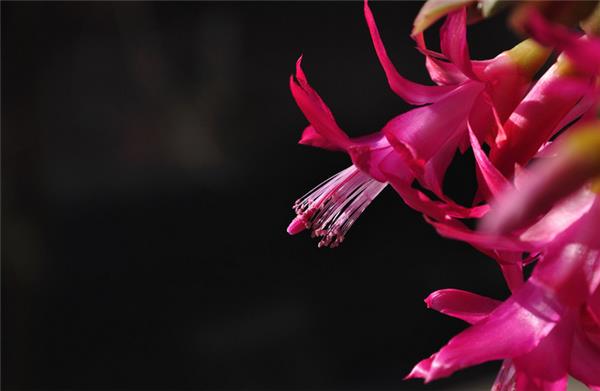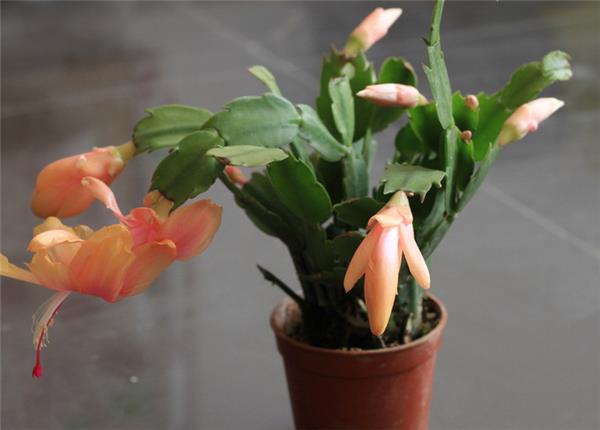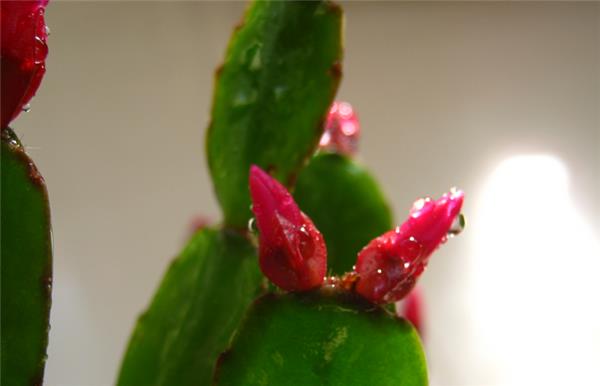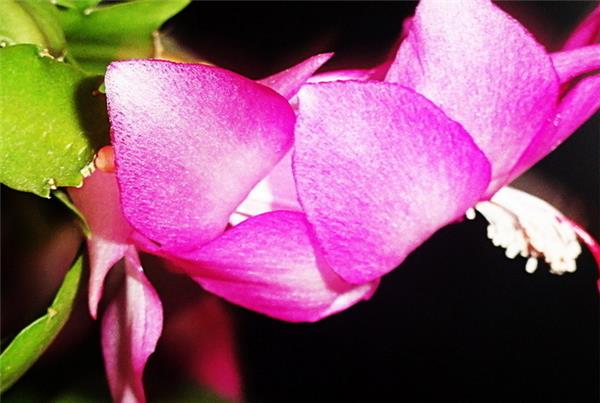[grafted crab claw orchid] how to graft crab claw orchid
Crab claw orchid is particularly adaptable, so in order to achieve a higher aesthetic effect, many friends choose the way of grafting, today to show you the grafting method of crab claw orchid, coupled with the picture of grafted crab claw orchid, you can know the grafting method at a glance.

The method of grafting crab claw orchid
1. Grafting time
The crab claw orchid can be grafted under the temperature of 10 ℃ and 30 min except in the severe cold and hot season. If the temperature is too high, the scion mouth and incision are easy to dry up or rot; the temperature is too low, it is difficult to heal, and the survival rate is low. The specific grafting period should be a warm sunny day from Qingming Festival to Grain Rain and Cold Dew to the Beginning of Winter.
2. Selection and treatment of rootstocks
Crab claw orchid grafting rootstock, can use cactus, cactus, measuring column and so on. Cut the green, robust, long, fleshy, fleshy branches from the mother plant and put them in the sun for 4 days. After the basal incision was slightly dry, they were inserted into the wet sand to promote the roots, planted in pots after rooting, and grafted after survival. Or in the seedling bed to cultivate grafted seedlings, and then transplant on the pot.
3. Scion cutting
The green, robust, pest-free crab claw orchid mother plant was selected, and the annual branches of the top 2-4 nodes were cut as scions. Use a blade to cut off the lower part 1GUAG4MULY 3 to expose the white xylem. The two sides are cut together to make it wedge-shaped. When cutting, it is best to cut it with one knife, and do not repeat the cutting.
4. Grafting method
First, cut off the top of the rootstock with a steel knife, cut a notch of about 2 meters along the center of the flat direction, which is as wide as the scion, and then obliquely cut the base of the scion into a ducktongue-shaped cutting surface of about 1.5 meters, and insert it into the cut of the rootstock to prevent it from slipping out. If the rootstock is higher, multiple scions can be grafted laterally at a certain distance in different directions of the stem.

2. Culture method of crab claw orchid
On the pot: when the seedlings are installed in the basin, first put 2~2cm thick coarse-grained matrix or ceramsite as a filter layer, sprinkle a layer of fully mature organic fertilizer as base fertilizer, the thickness is about 1~2cm, and then cover with a layer of matrix, about 1~2cm thickness, and then put in the plant to separate the fertilizer from the root system to avoid root burning.
Humidity management: like the drier air environment, overcast and rainy days last too long, vulnerable to bacteria infection. For fear of rain, keep the leaves dry at night. The optimum air relative humidity is 40%-60%.
Temperature management: the optimum growth temperature is 1532 ℃. It is afraid of high temperature and muggy heat and enters dormancy when the summer temperature is above 33 ℃. Avoid cold frost, the overwintering temperature needs to be kept above 10 ℃, and when the winter temperature drops below 7 ℃, it will also enter a dormant state. If the ambient temperature is close to 4 ℃, it will die of frostbite.
Light management: the leaf color will be more beautiful when you keep it in the semi-shade in summer, or give it 50% shade. In spring and autumn, because the temperature is not very high, it is necessary to give it direct sunlight to facilitate its photosynthesis to accumulate nutrients. In winter, keep it indoors where there is bright light for maintenance. Usually put in the indoor maintenance, should be placed in the southeast near the doors and windows, in order to receive light, and every month or one and a half months, to move to the outdoor maintenance for two months, otherwise the leaves will grow thin, yellow, new branches or petioles slender, elongated internodes, in a state of overgrowth.

Third, the influence of crab claw orchid on household environment.
There are many cultivated varieties of crab claw orchid. The common ones are white Christmas white, Dorsey, Gina, snowflakes, yellow golden beauty, Christmas flame, golden fantasy and so on. Crab claw orchid can effectively absorb carbon dioxide in the air and purify the air. The flowering period of crab claw orchid is from September to April of the following year, and the bright and gorgeous crab claw orchid brings people the smell of spring. No matter the day waiting for the flowers to bloom, or the days bathed in the faint flowers, it can make people feel happy. In particular, the crab claw orchid blossom coincides with these festive and lively festivals such as Christmas and New year's Day. the plant type hangs with bright and lovely colors, such as bright red, pink, apricot yellow, and pure white, which will be hung in the windowsill, the entrance of the doorway and the exhibition hall as decoration, which will immediately make the room full of glow. If modified or artificially controlled, some crab claw orchids can be regulated to bloom in October. The flowers are delicate and graceful, bright and beautiful, especially loved and praised by people.
The best way to propagate crab claw orchid is grafting, preferably in May-June or September-October. Cactus with cold tolerance and strong growth should be selected as rootstock. Two segments of sturdy and thick abnormal stem are selected as scions, and the lower end is cut into duckbill shape. Each rootstock can be grafted with 3 scions. Put it in a cool place after grafting, and if the scion remains fresh and straight after 10 days, it will survive. You will inadvertently gain a lot of unexpected fun in the process of taking care of him.

Put a pot of crab claw orchid in your room, you can't help feeling why such a pot of flowers will give you so many unexpected experiences and feelings.
Put a pot of crab claw orchid in your room, you can't help feeling why such a pot of flowers will give you so many unexpected experiences and feelings.
Related
- Wuhan Hospital Iron Tree Blooming Result Was Instantly Frightened by the Gardener Master
- Which variety of camellia is the most fragrant and best? Which one do you like best?
- What is the small blue coat, the breeding methods and matters needing attention of the succulent plant
- Dormancy time and maintenance management of succulent plants during dormancy
- Minas succulent how to raise, Minas succulent plant pictures
- What are the varieties of winter succulent plants
- How to raise succulent plants in twelve rolls? let's take a look at some experience of breeding twelve rolls.
- Attention should be paid to water control for succulent plants during dormant period (winter and summer)
- Watering experience of twelve rolls of succulent plants
- Techniques for fertilizing succulent plants. An article will let you know how to fertilize succulent plants.



